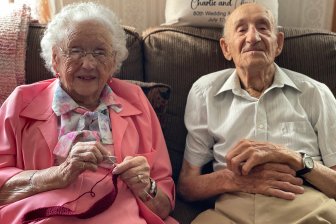Montreal is home to Canada’s largest Moroccan population and on Saturday, many community members awoke to the tragic news that the country’s central region was struck overnight by its largest recorded earthquake in over a century.
Recent reports from Morocco’s interior minister indicate that the death toll has now reached 1,037, as reported by the BBC. The epicentre of the 6.8 magnitude quake was in the country’s High Atlas Mountains region, which is about 71km southwest of the popular tourism destination of Marrakech.
On an average weekend morning, the La Amistad coffee shop in Montreal would be playing soccer games, but on Saturday it was all about the news.
“It’s a dark Saturday,” said Mouslih Yassine, a Moroccan Montrealer who works at the shop.
He said the earthquake is all his clients are talking about.
Outside of the La Amistad café in Montreal on Saturday, where groups of Moroccan Montrealers gathered to receive updates from local news channels as a 6.8 magnitude earthquake has taken the lives of hundreds in their home country.
Gloria Henriquez
“Since last night at 7 p.m., everyone is talking about those who are injured, those who died. It really is sad, we simply tried to call all our family members yesterday to see if they are healthy and okay,” he said.
Yassine’s family is in Casablanca, the largest city in the North African country, where the impacts of the earthquake were also felt. He said that after the earthquake, his family slept on the street for fear of a second one.
“They were shocked, it was surprising to them,” Yassine said. “We’re hoping it stops here. We really are hoping.”
The convulsions were felt all the way into the capital city of Rabat, which is located about 350 kilometres north of the epicentre.
Noureddene Mosbah, who has family in Marrakech, said some people woke up with “nothing” in the impacted areas.
“They have no help,” Mosbah said, “It’s very, very terrible.”
He says his friend told him on the phone this morning that he doesn’t have water or food.
The majority of victims are believed to be in remote villages near the mountainous area.
Members of Montreal’s Moroccan community gathered at La Amistad Cafe on Saturday morning as they awaited updates regarding the 6.8 magnitude earthquake that damaged infrastructure and took the lives of more than 1,000 people on Friday night.
Gloria Henriquez
Serge Sasseville, a Montreal city councillor, is currently vacationing in Morocco and was attending a gathering at a friend’s house about 25 minutes outside downtown Marrakesh when the earthquake first hit.
“It was really, really scary,” he said, adding that he, alongside a group of friends, gathered under blankets and lawn chairs outside while they awaited an expected aftershock following the first rumbling.
“You’re not in control of anything, you’re waiting for the worst to happen.”
The U.S. Geological Survey reported a 4.9 magnitude aftershock arrived 19 minutes later.
Sasseville said although no one was injured in his immediate circle, his friend’s house had sustained some damage and lost electricity during the earthquake. After sheltering in place for hours, he commuted back to his hotel in Marrakech at about 4:30 a.m. on Saturday.
Upon returning to the city, Sasseville said he witnessed hundreds of people sleeping on sidewalks and in parks. He said as of now, there have been fewer causalities inc Marrakech in comparison to harder-impacted areas outside of the city.
“The previous official toll from the Department of Interior was 820 and I could see that in Marrakech, out of the 820 deaths, there were 13,” he said during an interview with Global News on Saturday morning.
People prepare to burry a man who was killed by the earthquake, in Moulay Brahim village, near Marrakech, Morocco, Saturday, Sept. 9, 2023. (AP Photo/Mosa’ab Elshamy).
Many tourist attractions have experienced significant damage in the city’s main square, including the historic Jemaa el Fnaa mosque, which saw some of its tower partially collapse.
“My heart is with the family and friends of the people that were killed and wounded,” Sasseville said.
“Moroccans are very resilient people … Nobody has ever lived (through) an earthquake of such magnitude in Morocco, it’s terrible, I went through some minor earthquakes in the province of Quebec but that’s nothing compared to what happened last night in Morocco.”
Quebec Premier François Legault expressed his condolences in a social media post on Saturday.
“All my thoughts are with the Moroccan people,” he said.
There has been nothing bigger than a 6.0 magnitude earthquake within 500 kilometres of Friday night’s epicentre since before 1900.
Because it struck at 23:11 local time, it’s projected that the death toll will be larger than other earthquakes of similar intensity, as many people were likely to be inside affected buildings.
It’s estimated about 1,200 people have sustained injuries from the incident, but that official number is expected to rise.
Federal Foreign Affairs Minister Mélanie Joly has urged Canadians in Morocco to register with Global Affairs Canada after a deadly earthquake struck the country late Friday night.
In a tweet this morning, Joly says Canada’s thoughts are with all of those affected by the devastating quake.
She says Canadians in Morocco who need help should contact the federal Emergency Watch and Response Centre, which can provide emergency consular assistance.
Global Affairs Canada says it is working on an update about how many Canadians were in Morocco at the time of the disaster.
— With files from Global News’ Gloria Henriquez and the Canadian Press
© 2023 Global News, a division of Corus Entertainment Inc.



